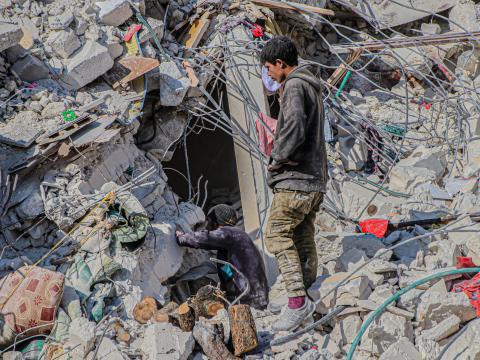Situation in Syria more critical than ever, one year on from earthquake – World Vision

Situation in Syria "more critical than ever", one year on from earthquake – World Vision
Amman, February 6, 2024 – The humanitarian situation in Syria is still incredibly dire, warns World Vision, a humanitarian aid organisation that has been operating in Syria since 2011. World Vision makes this stark warning as the world marks a year-to-the-day since the devastation of a 7.8-magnitude earthquake ripped through Northwest Syria and Southern Türkiye.
World Vision warns that not only is the conflict in Syria not over, with 13 years of ongoing violence, but the humanitarian needs resulting from it and last year's earthquake are still growing. Currently, 90% of Syrians live below the poverty line. Additionally, 4.1 million people in Northwest Syria rely on humanitarian aid, and food insecurity affects 3.7 million individuals.
To mark the tragic milestone, and 13-years of persistent and ongoing conflict, World Vision has released a policy brief highlighting the escalating humanitarian crisis in Northwest Syria, a comprehensive overview of the current situation, outlines urgent needs, and offers critical recommendations for immediate action.
The brief, Beyond the Rubble: The Impact of the Earthquake on Children in
Northwest Syria One Year Later, is available here
The brief draws attention to the following findings:
- The catastrophic earthquake in February 2023, compounded by a 13-year-long conflict, resulted in over 4,500 fatalities in Northwest Syria alone and inflicted extensive damage on infrastructure, including schools and hospitals, exacerbating the already dire humanitarian situation for the 4.1 million people reliant on aid.
- In Northwest Syria, the compounded crises of conflict, earthquake, and funding cuts have created a severe health and nutrition emergency. Nearly 6 million people, mainly children and women, are not receiving essential nutritional assistance, with children comprising a significant 64% of those in dire need. Healthcare services are in critical condition, facing closures and downsizing, while the number of individuals receiving food aid has halved, dropping from 2 million to just 1 million. This alarming situation demands urgent, targeted support to stabilize health and nutrition services and mitigate the rising child mortality rates.
- The complex emergencies in Northwest Syria have significantly heightened child protection issues, marked by an increase in child-headed households, child labour, and early marriages post-earthquake. This situation is further compounded by challenges in accessing essential documentation such as birth certificates, which restricts access to vital services and rights. The lack of proper documentation threatens to leave a generation of children without nationality, access to essential services such as education, and healthcare. Additionally, the closure of several Women and Girls Safe Spaces due to funding shortages and community centres due to security conditions has added to the challenges faced by the affected communities.
- Following the earthquake and years of conflict, a significant portion of the population in Northwest Syria finds themselves in inadequate shelters, with approximately 800,000 individuals still living in tents within often overcrowded and poorly managed camps. Compounding these conditions, the Shelter/NFI Cluster's winter appeal is facing significant funding challenges, with only 30% of the required funds secured.
To counter this, World Vision recommends:
- A political solution to the ongoing conflict in Syria through a peace process championed by the international community, fostering lasting stability and national healing.
- Unconditional and unrestricted humanitarian access ensure the survival of the Northwest Syria's 4.1 million inhabitants.
- Complete funding of the critically underfunded Syria Humanitarian Response Plan, ensuring that the humanitarian needs in Syria are thoroughly addressed.
- Engagement with and empowerment of local communities and organizations in planning and implementing projects, ensuring sustainability, capacity-building, and a timely, effective response to humanitarian needs.
Through this policy brief, World Vision emphasizes long-term resilience, community involvement, comprehensive monitoring, and the integration of innovative, climate-smart strategies in all recovery efforts.
Emmanuel Isch, World Vision's Syria Response's Director says:
"The region and the world seem to be more divided than ever. The number of conflicts seems to be growing, and climate change appears to be causing more and more natural disasters. World Vision wants to remind the world, on this sad milestone, that the people of Northwest Syria are still reeling from the ongoing impacts of both.
The scale of support needed for families and communities in Northwest Syria is escalating out of control, due to 13 years of conflict and a year of unmet needs from the devastating earthquake. The situation is now more critical than ever, and the world cannot afford to ignore the suffering here, despite the growing number of geopolitical distractions.
World Vision remains steadfast in its commitment to the Syrian people, advocating for their immediate needs and the promise of a more hopeful, stable future.”
ENDS
Notes to editor
For more information, please contact: Hamzah Barhameyeh, World Vision Syria Response Communications & Advocacy Manager, Email: hamzah_barhameyeh@wvi.org
World Vision is a global humanitarian organisation dedicated to working with children, families and their communities to reach their full potential by tackling the root causes of poverty and injustice. World Vision serves all people, regardless of religion, race, ethnicity or gender.
For more information, please visit https://www.wvi.org/syria-response or follow us on Twitter @WorldVisionSR.
World Vision Syria Response has been operating inside Syria, Jordan and Türkiye since 2011, where we provide life-saving protection, education, WASH, livelihoods and health services to refugees and local communities.